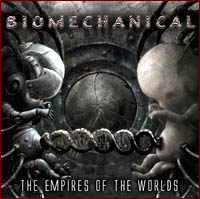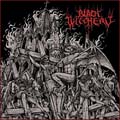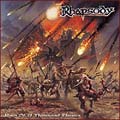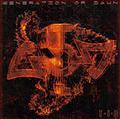BIOMECHANICAL (uk) - The Empires Of The Worlds (2005)

Label : Earache Records / Pias
Sortie du Scud : 6 juin 2005
Pays : Angleterre
Genre : Heavy/Thrash moderne
Type : Album
Playtime : 14 Titres - 54 Mins
Après leur premier album Eight Moons, paru en 2003 et unanimement salué par la critique, les Anglais de Biomechanical étaient attendus au tournant et se devaient avec leur second opus de confirmer la place d’espoir qui leur avait été accordée.
La musique de Biomechanical peut se définir comme la rencontre improbable entre le Thrash puissant de Pantera et le Heavy traditionnel de Judas Priest, le tout saupoudré d’orchestrations lui apportant une dimension mélodique et futuriste intéressante. Cette recette alléchante fonctionne à merveille sur le premier titre « Enemy within », accrocheur et entraînant comme il se doit ; le très puissant « Assaulter » ou encore le mélodique « Long time dead » et ses lignes de chant très « panteresques ». La technique et la musicalité sont au rendez-vous sur cet opus : le chant passe avec une facilité déconcertante d’un registre à un autre, les guitares nous gratifient de riffs un peu convenus mais efficaces, les synthés sont quant à eux utilisés intelligemment pour enrichir et densifier la musique du combo. Dommage cependant que le groupe ne parvienne pas à maintenir la cadence infernale installée par les premiers titres et que les morceaux s’essoufflent un peu en milieu d’album, à l’image des répétitifs et cacophoniques « Regenerated » et « DNA Metastasis », qui installent une certaine lassitude chez l’auditeur. L’intérêt de la galette est heureusement relancé par « Absolution », pièce conceptuelle ambitieuse en quatre parties qui révèle une facette plus progressive et mélodique de la musique des Anglais et mériterait de figurer sur la bande originale d’un film de science fiction, de par son ambiance futuriste et ses orchestrations apocalyptiques.
Bien qu’inégal et un poil trop chaotique, The Empires Of The Worlds est donc un album intéressant à plus d’un titre et qui confirme le potentiel du groupe. Dommage cependant qu’il laisse un arrière-goût de réchauffé, on a en effet l’impression à son écoute que Biomechanical a davantage cherché à créer un mélange original de ses influences plutôt que de proposer un style véritablement moderne et novateur.
Ajouté : Vendredi 24 Juin 2005
Chroniqueur : Cilou
Score :   
Lien en relation: Biomechanical Website
Hits: 17159
|














